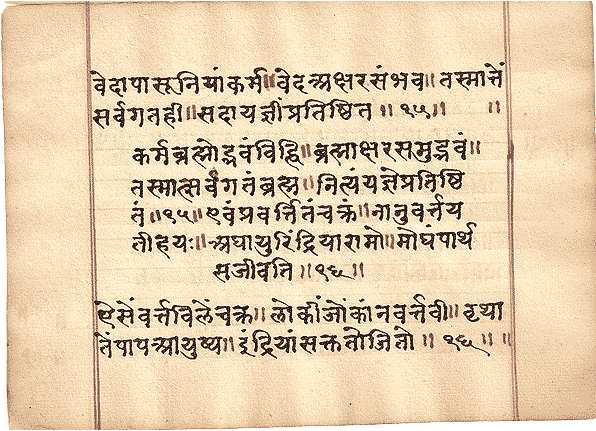BhG 3.15
karma brahmodbhavaṃ viddhi brahmākṣara-samudbhavam
tasmāt sarva-gataṃ brahma nityaṃ yajñe pratiṣṭhitam
To play the media you will need to either update your browser to a recent version or update your Flash plugin.
syntax
karma (activity) brahmodbhavam (that which comes from brahman / the Vedas) viddhi (you must know),
brahma (brahman) akṣara-samudbhavam (that which comes form the imperishable / the syllable) [vidhi] (you must know).
tasmāt (therefore) sarva-gatam (all-pervading) brahma (brahman) nityam (always) yajñe (in sacrifice) pratiṣṭhitam (steady) [asti] (it is).
grammar
| karma | – | karman 2n.1 n. – activity (from: √kṛ – to do); |
| brahmodbhavam | – | brahma-udbhava 2n.1 n.; yasya brahmaṇa udbhavam asti tat – that which comes from brahman (from: √bṛh – to increase, brahman – spirit, the Vedas; ud-√bhū – to spring up from, to produce, udbhava – springing from, production); |
| viddhi | – | √vid (to know, to understand) Imperat. P 2v.1 – you must know; |
| brahma | – | brahman 2n.1 n. – spirit, the Vedas (from: √bṛh – to increase); |
| akṣara-samudbhavam | – | a-kṣara-samudbhava 2n.1 m.; BV: yasya akṣarāt samudbhavam asti tat – that which comes form the imperishable / the syllable (from: √kṣar – to flow, to perish, a-kṣara – imperishable, a syllable; sam-ud-√bhū – to spring up from, to produce, samudbhava – springing from, production); |
| tasmāt | – | av. – therefore (from: tat sn. 5n.1 m. – from that); |
| sarva-gatam | – | sarva-gata 1n.1 n.; TP: sarvatra gatam iti – everywhere gone, all-pervading (from: sarva – all, whole; √gam – to go, PP gata – gone); |
| brahma | – | brahman 1n.1 n. – spirit, the Vedas (from: √bṛh – to increase); |
| nityam | – | av. – constantly, eternally (from: nitya – continual, eternal); |
| yajñe | – | yajña 7n.1 m. – in sacrifice, in worship (from: √yaj – to consecrate, to sacrifice, to worship); |
| pratiṣṭhitam | – | pratiṣṭhita (prati-√sthā – to stand firmly) PP 1n.1 f. – fixed, firm, steady; |
textual variants
karma brahmodbhavaṃ viddhi → brahma karmodbhavaṃ viddhi (you must know that brahman comes from activity);
Śāṃkara
The key:
an excerpt from the commented verse
quotes from the scriptures
starting polemic
|
|
tac caivaṃ vidhaṃ karma kuto jātam ity āha – | |
|
know thou that action comes from Brahman |
karma brahmodbhavaṃ viddhi brahmākṣara-samudbhavam | tasmāt sarva-gataṃ brahma nityaṃ yajñe pratiṣṭhitam ||3.15|| |
|
|
These activities are enjoined in the Veda (Brahman), and the Veda comes from the Imperishable, the Paramatman, the Highest Self. |
karma brahmodbhavam | brahma vedaḥ | sa udbhavaḥ kāraṇaṃ prakāśako yasya tat karma brahmodbhavaṃ viddhi vijānīhi | brahma punaḥ vedākhyam akṣara-samudbhavam akṣaraṃ brahma paramātmā samudbhavo yasya tat akṣara-samudbhavam | brahma veda ity arthaḥ | | |
|
Because the Veda has arisen from the Highest Self – the Akshara, the Imperishable, as the breath comes out of a man, therefore, the Veda, though all-comprehending as revealing all things, ever rests in sacrifice, i. e., it treats mainly of sacrifices and the mode of their performance. |
yasmāt sākṣāt paramātmākhyād akṣarāt puruṣa-niḥśvāsavat samudbhūtaṃ brahma tasmāt sarvārtha-prakāśakatvāt sarva-gatam | sarva-gatam api sat nityaṃ sadā yajña-vidhi-pradhānatvāt yajñe pratiṣṭhitam ||3.15|| |
Śrīdhara
tathā karmeti | tac ca yajamānādi-vyāpāra-rūpaṃ karma brahmodbhavaṃ viddhi | brahma vedaḥ | tasmāt pravṛttaṃ jānīhi | asya mahato bhūtasya niḥśvasitam etad ṛg-vedo yajur-veaḥ sāma-vedo |thāṅgīrasaḥ iti śruteḥ | yata evam akṣarād eva yajña-pravṛtter atyantam abhipreto yajñaḥ, tasmāt sarva-gatam apy akṣaraṃ brahma nityaṃ sarvadā yajñe pratiṣṭhitam | yajñenopāya-bhūtena prāpyata iti yajñe pratiṣṭhitam ucyata iti | udyama-sthā sadā lakṣmīr itivat | yad vā, jagac-cakrasya mūlaṃ karma tasmāt sarva-gataṃ mantrārtha-vādaiḥ sarveṣu siddhārtha-pratipādakeṣu bhūtārthākhyānādiṣu gataṃ sthitam api vedākhyaṃ brahma sarvadā yajñe tātparya-rūpeṇa pratiṣṭhitam | ato yajñādi karma kartavyam ity arthaḥ
Madhusūdana
tac cāpūrvotpādakam | brahmodbhavaṃ brahma vedaḥ sa evodbhavaḥ pramāṇaṃ yasya tat tathā | veda-vihitam eva karmāpūrva-sādhanaṃ jānīhi | na tv anyat-pāṣaṇḍa-pratipāditam ity arthaḥ | nanu pāṣaṇḍa-śāstrāpekṣayā vedasya kiṃ vailakṣaṇyaṃ yato veda-pratipādita eva dharmo nānya ity ata āha brahma vedākhyam akṣara-samudbhavam akṣarāt paramātmano nirdoṣāt puruṣa-niḥśvāsa-nyāyenābuddhi-pūrvaṃ samudbhava āvirbhāvo yasya tad-akṣara-samudbhavam | tathā cāpauruṣeyatvena nirasta-samasta-doṣāśaṅkaṃ veda-vākyaṃ pramiti-janakam iti bhāvaḥ | tathā ca śrutiḥ — asya mahato bhūtasya niḥśvasitam etad ṛg-vedo yajur-veaḥ sāma-vedo ‚thāṅgīrasa itihāsaḥ purāṇaṃ vidyā upaniṣadaḥ ślokāḥ sūtrāṇy anuvyākhānāni vyākhyānāny asyaivaitāni niḥśvasitāni [BAU 2.4.10] iti |
tasmāt sākṣāt paramātma-samudbhavatayā sarva-gataṃ sarva-prakāśakaṃ nityam avināśi ca brahma vedākhyaṃ yajñe dharmākhye ‚tīndriye pratiṣṭhitaṃ tātparyeṇa | ataḥ pāṣaṇḍa-pratipāditopadharma-parityāgena veda-bodhita eva dharmo ‚nuṣṭheya ity arthaḥ
Viśvanātha
tasya karmaṇo hetur brahma vedaḥ | vedokta-vidhi-vākya-śravaṇād eva yajñaṃ prati vyāpārotpattes tasya vedasya hetur akṣaraṃ brahma | brahmata eva vedotpatteḥ | tathā ca śrutiḥ – asya mahato bhūtasya niḥśvasitam etad ṛg-vedo yajur-veaḥ sāma-vedo |thāṅgīrasaḥ iti | tasmāt sarva-gataṃ brahma yajñe pratiṣṭhitam iti yajñena brahmāpi prāpyata iti bhāvaḥ | atra yadyapi kārya-kāraṇa-bhāvenānnādyā brahma-paryantāḥ padārtho uktās tad api teṣu madhye yajña eta vidheyatvena śāstreṇocyata iti | sa eva prastutaḥ –
agnau prāstāhutiḥ samyag ādityam upatiṣṭhate |
ādityāj jāyate vṛṣṭir vṛṣṭer annaṃ tataḥ prajāḥ || iti smṛteḥ
Baladeva
tac ca ṛtvig-ādi-vyāpāra-rūpa-karma-brahmodbhavaṃ viddhi | brahma-vedas tasmāt tat pravṛttiṃ jānīhīty arthaḥ | tac ca veda-rūpaṃ brahma akṣarāt pareśāt samudbhavaṃ prakaṭaṃ viddhi | asya mahato bhūtasya niḥśvasitam etad ṛg-vedo yajur-veaḥ sāma-vedo |thāṅgīrasaḥ ity ādi-śravaṇāt | yasmāt sva-sṛṣṭa-prajopajīvanāti-priyo yajñas tasmāt sarva-gataṃ nikhila-vyāpakam api brahma nityaṃ sarvadā yajñe pratiṣṭhitaṃ tenaiva tat prāpyata ity arthaḥ
- Copyright © 2010-2013 Quo Vadis Vision. Wszelkie prawa zastrzeżone.
- |
- About the project
- Appendices
- Audio
- Forum
- Contact

